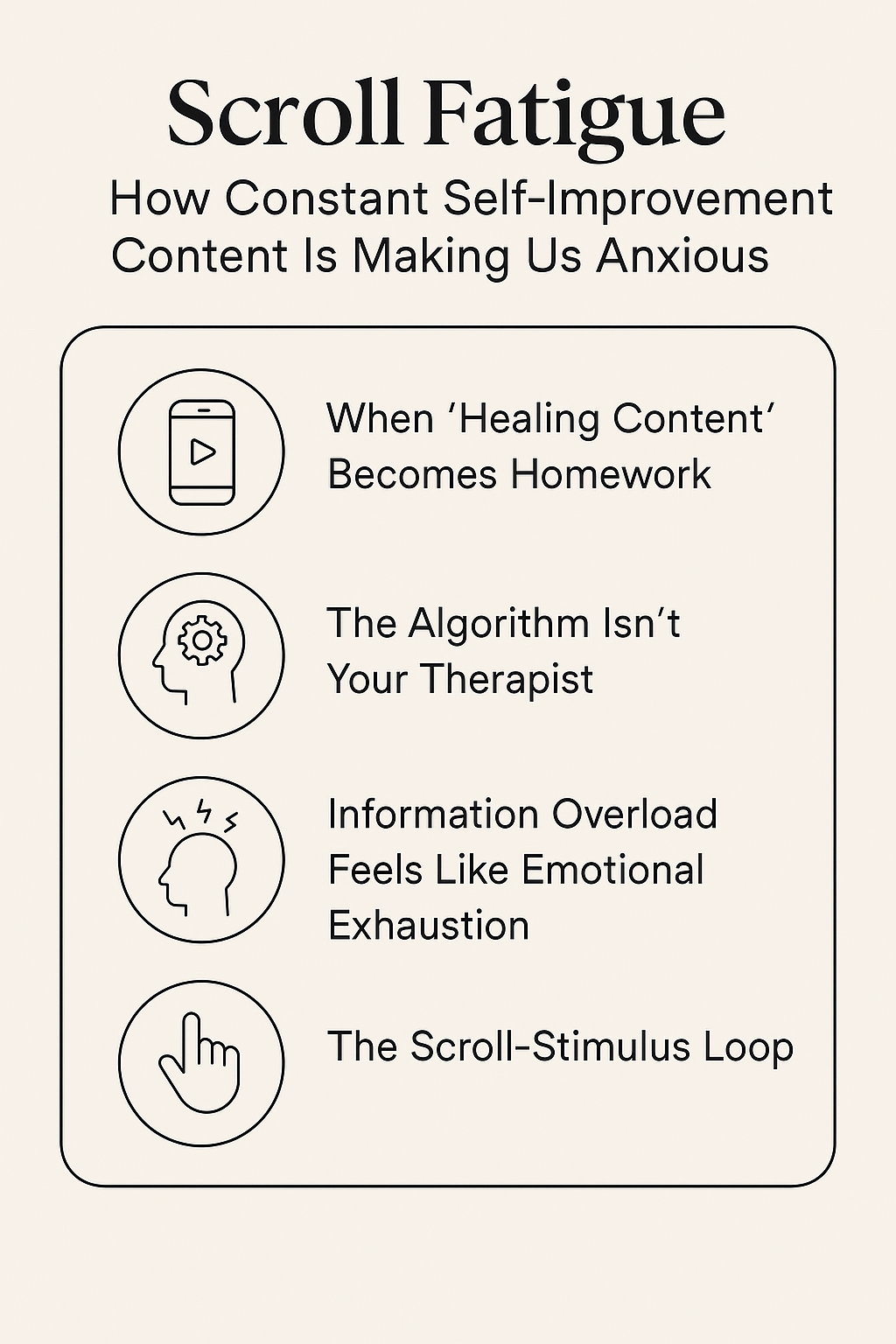Scroll Fatigue: How Constant Self-Improvement Content Is Making Us Anxious
Your Feed Is Full of Fixes — But You Still Feel Broken
You scroll through your feed for a little escape — but instead of cat videos or brunch inspo, it’s:
- “5 Signs You Have Anxious Attachment”
- “Why You Keep Attracting Emotionally Unavailable People”
- “Morning Routines That Will Heal Your Inner Child”
It’s not bad advice. In fact, most of it comes from therapists, coaches, or creators who genuinely want to help.
But after an hour of “healing content,” you’re not feeling better — you’re overwhelmed, self-conscious, and suddenly convinced you have 12 new mental health diagnoses.
Welcome to scroll fatigue — the burnout that happens when self-improvement becomes a 24/7 spectator sport.
.png)
The Paradox of Self-Help Content
We crave growth — especially in a city like Midtown Toronto, where ambition runs deep and therapy is practically a lifestyle.
But the endless stream of mental health content blurs the line between inspiration and overload.
What started as empowerment becomes pressure:
“I should meditate more.”
“I should communicate better.”
“I should be healing faster.”
And the word should is exactly where anxiety lives.
1. When “Healing Content” Becomes Homework
Every scroll becomes a mini self-assessment.
You start watching TikToks not for fun, but to figure out what’s wrong with you this week.
It’s the illusion of productivity — the idea that if you keep consuming advice, you’re growing. But real healing doesn’t happen from knowing more — it happens from doing less.
Therapy helps you pause the constant analysis and come back to presence — the only place where real change happens.
2. The Algorithm Isn’t Your Therapist
Social media algorithms are designed to give you more of what you watch.
If you linger on one video about attachment styles, your feed suddenly becomes a diagnostic maze.
But unlike your therapist, your feed doesn’t know your context, your trauma history, or your growth timeline. It just knows how to keep your attention — even if that attention is anxious.
You end up comparing your healing journey to people you don’t even know, wondering why you’re not as “regulated” or “self-aware” as they seem.
Spoiler: even the creators aren’t that calm offline.

3. Information Overload Feels Like Emotional Exhaustion
Self-improvement content often floods your nervous system with conflicting advice:
- “Feel your feelings” — but also “don’t spiral.”
- “Set boundaries” — but also “be compassionate.”
- “Be self-aware” — but “stop overthinking.”
Your brain can’t integrate it all, so it shuts down.
That shutdown looks like doom-scrolling, distraction, or “numb scrolling” — seeking peace through more input.
It’s not laziness; it’s emotional fatigue. You’re overstimulated from trying too hard to get better.
4. The Psychology of ‘Healing Comparison’
Self-help content has turned healing into a highlight reel.
You see creators crying gracefully in golden-hour lighting, journaling in matching sets, talking about boundaries in perfect soundbites.
Meanwhile, your real healing looks like laundry piles, cancelled plans, and moments where you’re not sure if you’re growing or just tired.
And that comparison creates shame — the quiet belief that you’re failing at healing.
But there’s no perfect way to get better. Healing is supposed to be messy, nonlinear, and real.
5. The Scroll-Stimulus Loop
Psychologically, every time you scroll, you get a dopamine hit.
Combine that with emotionally charged self-help content, and your nervous system is on a rollercoaster of validation, guilt, and curiosity.
Your brain starts associating learning about yourself with relief — but that relief doesn’t last. So you scroll again.
It’s not your fault — it’s neuroscience. But it’s also why therapy feels so different: it gives you space to process instead of perform.
How Therapy Can Help You Unplug and Reconnect
At KMA Therapy’s Yonge and Eglinton location, we often see clients who are hyper-aware but emotionally depleted — people who know the psychology, but can’t seem to feel the peace it promises.
Therapy can help you:
- Reduce anxiety caused by constant self-analysis
- Build mindfulness beyond your phone
- Develop self-compassion without comparison
- Learn to feel better, not just know better
Because you don’t need another “healing hack.” You need human connection, reflection, and rest.
From Scrolling to Stillness
You don’t have to delete your apps or reject self-improvement — you just need boundaries around when, and how, you consume it.
Growth isn’t something you scroll your way into; it’s something you live into — quietly, imperfectly, and at your own pace.
.png)
Ready to Step Off the Self-Help Hamster Wheel?
If your feed has turned into therapy you didn’t ask for, our Midtown Toronto therapists can help you reset and reconnect.
Book your 15-minute discovery call today to get matched with a therapist who helps you unplug from the noise and tune back into yourself.
Book your free 15-minute discovery call →






